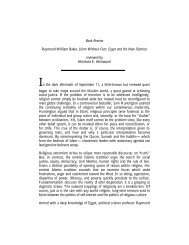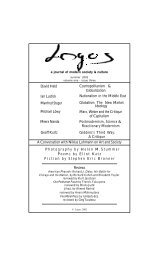Michael J. Thompson Stephen Eric Bronner Wadood Hamad - Logos
Michael J. Thompson Stephen Eric Bronner Wadood Hamad - Logos
Michael J. Thompson Stephen Eric Bronner Wadood Hamad - Logos
Create successful ePaper yourself
Turn your PDF publications into a flip-book with our unique Google optimized e-Paper software.
Stanley Aronowitz<br />
orders to which they gravitate or are assigned by virtue of their education and<br />
training, situations which themselves are the outcome of certain interactions<br />
and relationships. The formation of the self in childhood is crucial for<br />
structuring the life chances of individuals, conditioning, if not completely<br />
determining the ways they structure knowledge, their emotional and volitional<br />
proclivities. But these processes are only relatively unique in individuals;<br />
conditions of social location, class, race and ethnicity, and education—play a<br />
decisive part in shaping the choices available to whole groups of people. The<br />
basic unit of analysis then, is not the individual but collective selves.<br />
Thus his writings are suffused with “ideal types”—Weber’s methodological<br />
prescription to fashion composite profiles against which to measure any<br />
particular instance of the type—arranged horizontally as well as vertically. The<br />
models assembled in The New Men of Power—of labor leaders, or in The<br />
Power Elite, where he provides a collective portrait of business leaders, and in<br />
his essays published in the collection Power Politics and People which contains<br />
several composites of the various publics which he addresses and to which he is<br />
obliged to respond—give a glimpse of Mills’s lifelong approach to social<br />
knowledge: first, produce a composite profile of the subject. Then, provide<br />
detailed historically-informed descriptions of the context within which the<br />
subject(s) operate, and evaluate the relative salience of each element of this<br />
context to how the subject is shaped. Then, return to the subject by unpacking<br />
the composite to break down the different social and character types. Finally,<br />
re-place them in the larger political, economic and cultural situations. To what<br />
end? To find out what are the alternatives to the main drift of politics and<br />
ideologies. Needless to say, although a student of élites, Mills asks whether the<br />
democratic movement from below, of the rank and file union members,<br />
fractured publics of consumers and intellectuals, may succeed in overcoming<br />
the pervasive tendency toward oligarchic domination of government and civil<br />
life.<br />
For most of his academic career Mills taught sociology at Columbia<br />
University. He produced social knowledge but was also an intellectual agitator.<br />
He was deeply interested in advancing the science of sociology as a means of<br />
giving us a wider understanding of how society worked. But, from the late<br />
1940s when, at age thirty two, Mills and Helen Schneider produced their<br />
landmark study of the American labor union leaders, he remained a close<br />
<strong>Logos</strong> 2.3 – Summer 2003




